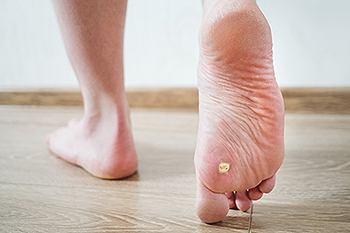Connect With Us
Blog
Soccer and Foot Problems

Proper foot care is essential for soccer players, as their feet are their primary tools on the field. Just like a carpenter maintains their tools, soccer players must take care of their feet to perform effectively. Parents whose children play soccer should regularly check their children's feet for any issues and teach them to promptly report any discomfort. Common foot issues in soccer players include abrasions, athlete's foot, blisters, calluses, and corns. Additionally, bruises, cysts, ingrown toenails, toenail loss may also become concerning foot conditions. Less common but serious issues like broken bones, bone bruises, bone spurs, and sprains should be treated by podiatrists promptly. If you are a parent or player, it is suggested that you schedule an appointment with a podiatrist in advance to ensure proper care, if needed.
Sports related foot and ankle injuries require proper treatment before players can go back to their regular routines. For more information, contact one of our podiatrists of Foot & Ankle Associates of Maine. Our doctors can provide the care you need to keep you pain-free and on your feet.
Sports Related Foot and Ankle Injuries
Foot and ankle injuries are a common occurrence when it comes to athletes of any sport. While many athletes dismiss the initial aches and pains, the truth is that ignoring potential foot and ankle injuries can lead to serious problems. As athletes continue to place pressure and strain the area further, a mild injury can turn into something as serious as a rupture and may lead to a permanent disability. There are many factors that contribute to sports related foot and ankle injuries, which include failure to warm up properly, not providing support or wearing bad footwear. Common injuries and conditions athletes face, including:
- Plantar Fasciitis
- Plantar Fasciosis
- Achilles Tendinitis
- Achilles Tendon Rupture
- Ankle Sprains
Sports related injuries are commonly treated using the RICE method. This includes rest, applying ice to the injured area, compression and elevating the ankle. More serious sprains and injuries may require surgery, which could include arthroscopic and reconstructive surgery. Rehabilitation and therapy may also be required in order to get any recovering athlete to become fully functional again. Any unusual aches and pains an athlete sustains must be evaluated by a licensed, reputable medical professional.
If you have any questions please feel free to contact our office located in Brunswick, ME . We offer the newest diagnostic and treatment technologies for all your foot and ankle needs.
Let the Expert Treat Your Ingrown Toenails
What Is the Role of a Foot Specialist?

A podiatrist, a medical professional specializing in the care and treatment of the feet, ankles, and lower extremities, plays a pivotal role in maintaining overall foot health. Trained to diagnose, treat, and prevent a spectrum of foot-related conditions, podiatrists undergo extensive education, focusing on the intricacies of the musculoskeletal system below the knee. From common issues like ingrown toenails and plantar fasciitis to complex conditions, such as foot deformities and diabetic foot complications, podiatrists provide comprehensive care. They offer a range of treatments, including medication, orthotics, and in some cases, surgical intervention. Beyond addressing acute concerns, podiatrists emphasize preventive care, offering guidance on proper footwear, gait analysis, and lifestyle adjustments to promote optimal foot health. Given the intricate interplay between foot health and overall well-being, consulting a podiatrist ensures specialized care for your feet. If you are interested in pursuing a career in podiatry, it is suggested that you speak to this type of healthcare professional who can address any questions you may have.
If you are dealing with pain in your feet and ankles, you may want to seek help from a podiatrist. Feel free to contact one of our podiatrists from Foot & Ankle Associates of Maine. Our doctors can provide the care you need to keep you pain-free and on your feet.
What Is a Podiatrist?
A podiatrist is a doctor of podiatric medicine who diagnoses and treats conditions of the foot, ankle, and related structures of the leg. Your podiatrist may specialize in a certain field such as sports medicine, wound care, pediatrics, and diabetic care. Podiatrists have the ability to become board certified through training, clinical experience, and then taking an exam.
What Do Podiatrists Do?
On a daily basis, a podiatrist may perform the following activities:
- Diagnose foot ailments such as ulcers, tumors, fractures, etc.
- Use innovative methods to treat conditions
- Use corrective orthotics, casts, and strappings to correct deformities
- Correct walking patterns and balance
- Provide individual consultations to patients
It is very important that you take care of your feet. It’s easy to take having healthy feet for granted, however foot problems tend to be among the most common health conditions. Podiatrists can help diagnose and treat a variety of feet related conditions, so it is crucial that you visit one if you need assistance.
If you have any questions please feel free to contact our office located in Brunswick, ME . We offer the newest diagnostic and treatment technologies for all your foot and ankle needs.
Diagnosis of Plantar Warts

Plantar warts, also known as verrucae plantaris, are warts that appear on the bottom of the feet, often in areas that bear weight like the heels, toes, and the middle of the foot. These warts can be particularly painful and difficult to treat because walking puts pressure on them, causing them to grow inward. Sometimes, many warts can grow together, forming what is known as mosaic warts. It can be hard to tell plantar warts apart from corns or calluses. Corns are hard skin that forms over joints from pressure and rubbing. They have a hard core and do not have the small black dots that warts do. Soft corns form in moist areas between toes due to pressure and rubbing. Another condition often mistaken for plantar warts is black heel, which can be seen in athletes like tennis or basketball players. This is where tiny blood vessels break, causing small black or brown spots on the heel or side of the foot. Carefully removing the top layer of skin can help separate this condition from warts, calluses, corns, and serious issues such as malignant melanoma. If you have what appears to be a wart on your foot, it is suggested that you make an appointment with a podiatrist for a proper diagnosis and treatment.
Plantar warts can be very uncomfortable. If you need your feet checked, contact one of our podiatrists from Foot & Ankle Associates of Maine. Our doctors will assist you with all of your foot and ankle needs.
About Plantar Warts
Plantar warts are the result of HPV, or human papillomavirus, getting into open wounds on the feet. They are mostly found on the heels or balls of the feet.
While plantar warts are generally harmless, those experiencing excessive pain or those suffering from diabetes or a compromised immune system require immediate medical care. Plantar warts are easily diagnosed, usually through scraping off a bit of rough skin or by getting a biopsy.
Symptoms
- Lesions on the bottom of your feet, usually rough and grainy
- Hard or thick callused spots
- Wart seeds, which are small clotted blood vessels that look like little black spots
- Pain, discomfort, or tenderness of your feet when walking or standing
Treatment
- Freezing
- Electric tool removal
- Laser Treatment
- Topical Creams (prescription only)
- Over-the-counter medications
To help prevent developing plantar warts, avoid walking barefoot over abrasive surfaces that can cause cuts or wounds for HPV to get into. Avoiding direct contact with other warts, as well as not picking or rubbing existing warts, can help prevent the further spread of plantar warts. However, if you think you have developed plantar warts, speak to your podiatrist. He or she can diagnose the warts on your feet and recommend the appropriate treatment options.
If you have any questions please feel free to contact our office located in Brunswick, ME . We offer the newest diagnostic and treatment technologies for all your foot and ankle needs.

